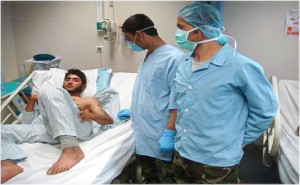
KANDAHAR, Afghanistan – Lt. Col. Sher Mohammad, 3rd Special Operations Kandak commander, rushed to rally his men for a very important task. One of his best and brightest soldiers was critically wounded and in dire need of help.
Earlier that July morning, in southern Afghanistan, Capt. Najibullah performed his mission as a team leader in the Afghan National Army Special Forces as he always did. But things took a drastic turn, setting into motion a remarkable chain of events that truly proves the bond among brothers in arms.
While leading his men on a clearing operation to disrupt insurgent activity in Maiwand District’s Koka village, Najibullah shot and wounded an enemy fighter. The insurgent fled. Najibullah followed him unknowingly into an empty home that was rigged with explosives. A bomb exploded and instantly severed both of Najibullah’s legs. That’s when the phenomenal story of brotherhood beyond borders began to unfold.
“We got the call that one of the ANASF soldiers from Maiwand was getting medically evacuated [to a hospital on Camp Hero], so immediately we went down to the kandak and tried to meet up as soon as possible with them to see what was going on,” said a U.S. Special Forces team sergeant. “We saw them, and they said [Najibullah] needed quite a bit of blood. They said he needed B negative, and I know that’s pretty rare. I have B negative, so I just jumped in there.”
Meanwhile at Camp Hero, the 3rd SOK command sergeant major coordinated a blood drive at the base. The Afghan National Army Commandos were more than willing to donate blood for their comrade.
“Lt. Col. Sher Mohammad rushed down there before anyone else,” said the American team sergeant. “Whatever he could give he gave. He got as many of his guys as he could down there and helped orchestrate the whole blood drive. He’s definitely all about his guys – his special forces guys and commandos.”
Mohammad and his men described their actions not as heroic, but as simply helping their fellow soldier and brother.
“As a battalion commander and his direct supervisor in the chain, it was my sole duty to do whatever it took to save my soldier’s life,” said Mohammad, who also has the rare blood type. “Therefore, I performed my duty to save my soldier’s life and boosted the rest of my soldiers’ confidence by volunteering to be the first person to donate blood for Capt. Najibullah.”
Medics from the 3rd SOK tested the commandos’ blood and assisted with the blood draw at Kandahar Regional Medical Hospital located on Camp Hero.
“I volunteered because he’s one of our soldiers, and he’s our brother,” said an Afghan commando. “It’s like helping one another as a family member. I did it because I wanted to save one of our brothers and comrades’ lives. This is our sole duty [and] that’s what we are here for — to help one another.”
The commando didn’t know Najibullah personally, but he still considered him family.
The American soldier who donated shared similar sentiments toward the man he affectionately called “Naji.”
“These guys are pretty good friends of ours – they’d do anything for us,” said the American team sergeant. “It didn’t matter to me that Naji was an Afghan at all. These are the same guys we go out with, [and] it’s usually just me and one other [American] guy and them.”
The American Special Forces sergeant and his teammates visited Naji at the hospital everyday to check on him and push to get him transported to Kabul to perform the next necessary surgery.
“I sometimes like these guys better than the Americans I work with,” the American team sergeant said, with a bit of levity in his voice. “They are awesome. These guys don’t get paid much at all, and they do this all year round. I consider him to be one of our own, a brother, and part of my family – the same as us.”
The sergeant explained how Naji was talking with the U.S. Special Forces team and with his family a few nights after the incident.
“He’s doing a lot better; he’s kind of in and out and he’s still in shock,” said the U.S. Special Forces sergeant. “We’re gonna bring him dinner tonight. If we can get him out of here he’ll make it –it’s looking pretty good right now. We’re trying to get him out tomorrow.”
Despite continued medical treatment and the support of his brothers in arms, Najibullah passed away several days later. He paid the ultimate sacrifice for his country, succumbing to his wounds in Kabul on the morning of Aug. 6. He is survived by his wife and seven children.
Najibullah’s fellow soldiers described him as dedicated, professional, a motivated loyal supporter of the Government of the Islamic Republic of Afghanistan, and a protector of the people. He dedicated himself to improving the lives of Afghans in Kandahar and fighting the Taliban, specifically in Maiwand, an area plagued by insurgents and improvised explosive devices that have killed or maimed countless Afghan civilians and soldiers.
“Capt. Najibullah was one of my fine soldiers who [died] in carrying out a mission that was given to him by my order,” said Mohammad. “He was one of my greatest subordinates and a brave son of this country.”
Five soldiers – four Afghans and one American – donated blood for Naji, but not because they had to. They explained they belonged to something bigger than themselves, something beyond cultural and national boundaries. They gave part of themselves without hesitation to save their brother.
“It’s a sad story, but as soldiers, we have made the commitment to sacrifice ourselves to protect our countrymen,” said 3rd SOK Chief of Culture and Religion Maj. Abdul Bari Auda. “We are sons of this country and we are willing to sacrifice and help however we can to save our people’s lives.”






